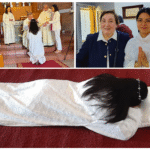By F. Luis Casasus, General Superior of idente missionaries
Commentary on the Sunday Gospel of 4-2-2018, V Sunday in Ordinary Time (Book of Job 7:1-4.6-7; 1 Corinthians 9:16-19.22-23; Saint Mark 1:29-39)
It may be appropriate to frame today’s gospel reading with a sharp remark of Benedict XVI:
I maintain that these cures are signs: they are not complete in themselves but guide us towards Christ’s message, they guide us towards God and make us understand that man’s truest and deepest illness is the absence of God, who is the source of truth and love. Only reconciliation with God can give us true healing, true life, because a life without love and without truth would not be life. The Kingdom of God is precisely the presence of truth and love and thus is healing in the depths of our being. One therefore understands why his preaching and the cures he works always go together: in fact, they form one message of hope and salvation.
Jesus healed everyone who came to Him in Capernaum. He accepted everyone, even those who might have been considered “unworthy”. No one was excluded. Jesus made it clear that He came to overturn the works of the devil and to cancel out the devastation of sin. Through His healing touch, He invited everyone to follow Him and allow Him to rule in their hearts. Simon Peter’s mother-in-law was one of those who accepted Jesus’ invitation. As soon as she received Jesus’ healing touch, she began serving Him and His companions (Mark 1:31). There seemed to have been no hesitation: She was so grateful for what the Lord had done for her that she immediately arose to serve Him.
In connection with this scene, the following suggestions seem worth doing:
* Are we convinced that everyone of us needs healing?
* If the answer is yes, do you realize that it is always a case with multiple wounds? This possibly indicates that we have to be patient with ourselves and with others when we make mistakes or slip back on the spiritual path.
* If the final diagnosis is –following Benedict XVI observation– the absence of God, do you think that the emergency treatment is to make unmistakable the presence of God in your life and my life?
Well, perhaps we are not convinced that this healing is urgent but, when the apostles appeal to Jesus in favor of Peter’s mother-in-law, Jesus immediately responded to go and heal her.
The whole of Jesus’ mission was to find sick and oppressed people, to rectify our sinful acts, to place us in the right path. He came for this purpose. Jesus taught that His mission to earth was to proclaim freedom for the prisoners and recovery of sight for the blind, to release the oppressed (Lk 4:18). Indeed, His mission cannot be defined without speaking of people as being sick and paralyzed in many aspects.
While material poverty is close to Jesus’ heart, and is something that we are called to alleviate, Jesus himself, not money or anything else, is the fundamental need of every human heart. Jesus is our supreme treasure, and release from spiritual bondage and poverty is our greatest need. This is the perspective of a missionary disciple who is faithful to the Spirit of the Gospel, not just to a common and universal compassion. In everything we do, let our intention be to inspire and encourage our neighbor to follow the example set by Peter’s mother-in-law, finding the way to help others as soon as she had been healed.
Her story does not end with her hospitality to Jesus. It was just the beginning of a life made immediately available to Jesus and His apostolate. Her home became His home. Whenever Jesus was in Capernaum, He always had a place to stay. But there was more. As soon as the sun had set, people began to bring the sick to her courtyard to be touched by Jesus. Mark tells us the whole city gathered at her door. Her priorities were changed. Possessions no longer held the same place in her life. Her home became a safe haven.
She showed the way of salvation to many by serving others as a harbor for the spiritually broken. Time and time again the sick and oppressed were brought to her door. Do you remember the story of the paralytic who was lowered through the roof into the room where Jesus was? What kind of homeowner would understand the kind of desperation that would drive someone to break open the roof of a stranger? Mark tells us who that homeowner was. It was Peter’s mother-in-law! She understood desperation. Helping a paralyzed man get into the presence of Jesus was more important to her than keeping her roof intact! Like her, we need to open our hearts and homes to help people find Jesus.
Sometimes we may be prepared to interact with our neighbors at our workplace or study place, but the thought of inviting them into our home or religious residence still seems strange or uncomfortable. Sadly, many of us have become accustomed to a culture that says: my home is my retreat from the daily fatigue and chaos of life instead of viewing our home and our community/family as an apostolic instrument, a resource for living on mission in common. The reality is, one of the best ways you can build trust and relationship with your neighbors is by inviting them into the space that culture says is yours alone. Once we recognize that we are ambassadors for Christ we will begin to see our homes as embassies of the kingdom of Heaven, which exist for a greater purpose than our own comfort and escape. Our father Founder, Fernando Rielo, always encouraged us to do this and there are many Provinces that are really faithful (and consequently fruitful) in heeding this advice.
Do we share St. Paul’s perspective, his urgency to communicate and share what he received, what he was continuously receiving? He was always a man of mission with a sense of urgency in him. In fact, St. Paul compares our mission and goal to runners taking part in the race. Maybe we do not appreciate the immense gift which we all have received. Yes, possibly we need to escape our lack of perspective, because we rather look at our difficulties and some legitimate anxieties. Do you remember this old story?
In the late 12th century, a visitor observing the construction of a cathedral, asked of a stonecutter: What are you doing? And he answered: I am cutting stone for this wall, this is a very hard work and the salary is too low; I am really tired of this job. The visitor asked another worker: What are you doing? And he answered: I am laying stones for the wall; it is not an easy job, but I had to make a living for my family. Nearby, a third worker was sweeping up after the stonemason and bricklayer. He too was asked: What are you doing? And he answered: I am building a cathedral to the glory of God.
If someone were to have asked Simon’s mother-in-law that day: What are you doing? she would have replied: I am building the Kingdom of God. That is perspective. But let us not deceive ourselves: We can only acquire this holy perspective opening our hearts to the gifts of the Holy Spirit and embracing them:
I urge you therefore, brethren, by the mercies of God, to present your bodies a living sacrifice, holy and acceptable, which is your reasonable service. And do not be conformed to this world, but be transformed by the renewing of your mind (Rom 12:1-2a).
These are the fruits of Mystical Recollection and Quietude. The short-term value of perspective is that you will know God’s will. The long-term value of perspective is that it will enable you to live in light of eternity. The short term value and the long term value of perspective will give you confidence, peace and joy. If we are always thinking about our needs and ourselves, it is because, like a sick person, we tend to be inward looking and thinking of our pain. But when we begin to reach out, to focus on others more and more, we forget about our own problems or rather, we see them in perspective. So service is the way to bring us out of our problems and misery. It gives meaning and direction to our lives.
In our apostolic life, we soon realize that the harvest is plentiful but the laborers are few. Jesus too felt these demands in his public life. He spent the day healing and teaching. Some of us have experienced at one time or another the feeling of being psychologically and physically exhausted. In some moments we have to resort to silent prayer, as Jesus did. Because our continuous state of prayer has different moments; prayer happens in many different ways. It does not necessarily have to use any words. Our idente religious Observance includes this privileged form of silent prayer.
But we are afraid of silence and being alone with God. We are afraid to face the truth about ourselves. Similarly, this is why we are busy trying to replace our neighbors with gadgets because our fellowmen seek to make us better people We are afraid of silence because it speaks to us of loneliness, of being disconnected, of something being missing.
I am afraid to really confront myself because my pride would likely be wounded at what I would be forced to admit upon an honest examination. I am not the parent, friend or apostle I should be.
When we speak about silence we are no longer thinking in terms of sounds; by “silence” we refer not only to, the absence of speech or noise. By silence we mean the absence of the continuous stream of agitation, produced by our activity and distributed attention (which is NOT a negative concept).
I am afraid of what it means to be saint. Silent prayer is an opportunity to examine our true motives for service, checking that sure that we are building the kingdom of our Father… and not ours. This is important because we tend to look for security and familiarity. This is why some religious refuse to be transferred to a new place and bask in a feeling of indispensability, being surrounded by admirers
Sadly, we are interested in success, not fidelity to the will of God. But in reality we are successful when we give a testimony; this is the modest raw material the Holy Spirit will use to save people, to perform miracles in our neighbor.
If I sit in silence long enough, experience tell us that I might actually hear the voice of God. This is quite challenging possibility, because God will call me to change. He will draw me toward deeper obedience, and I know that means leaving treasured passions and long-held personal preferences behind in favor of being conformed to the image of Christ and following him into a true self-denial.
Perhaps this is the main reason why Jesus tells us: Be not afraid











